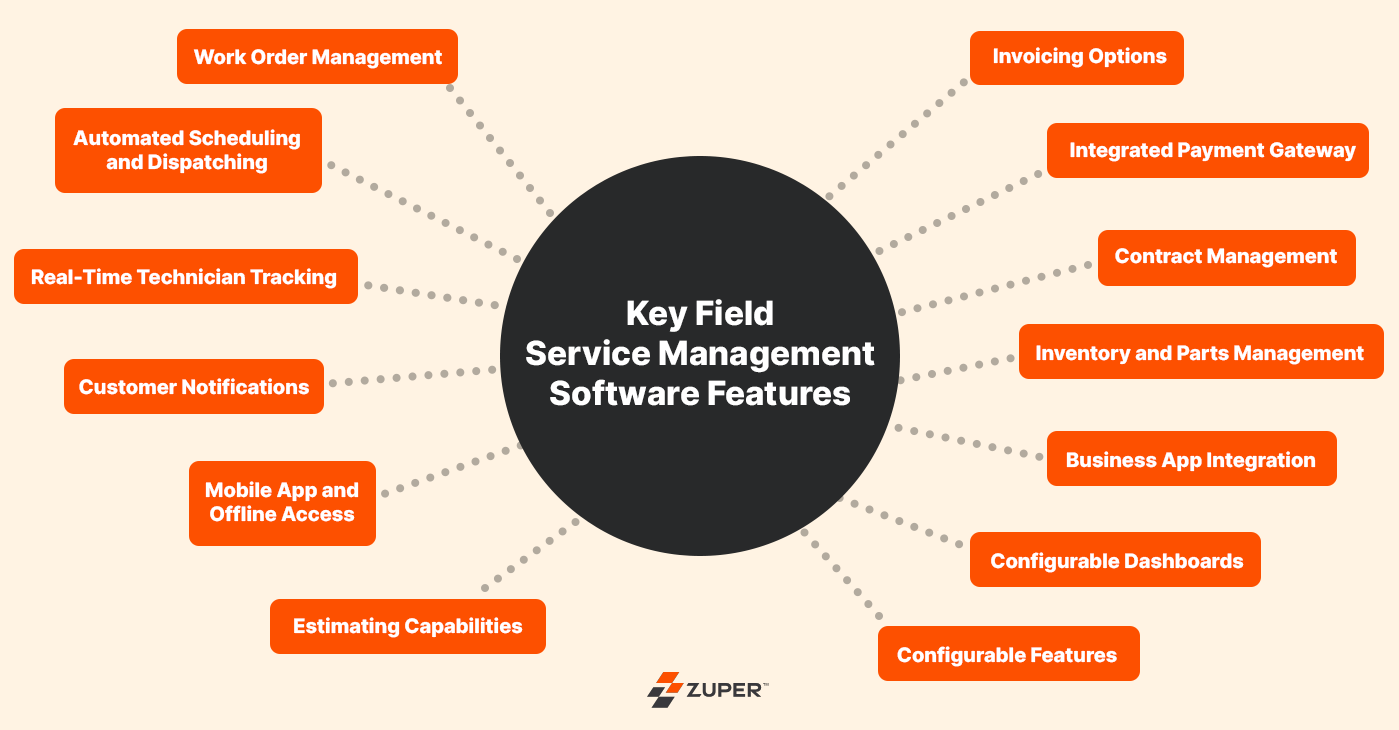The right field service management (FSM) software can be a game-changer. It will help you to optimize your operations by reducing costs, boosting productivity, keeping customers happy, and gaining valuable insights into your field service business. The wrong choice, however, can end up costing you wasted resources, frustrated employees, and lost opportunities.
Here are the top field service management software features you should consider when looking for an FSM solution that will set your field service business up for success.
Effective Field Service Management
Field service management (FSM) is the process of scheduling appointments, assigning technicians, ensuring quality service, and meeting customer expectations. It is essential for installation and service industries such as HVAC, roofing, plumbing, and electrical. FSM is also widely used in many other businesses, including food delivery, transportation, healthcare, telecom, and building maintenance services.
Essential Capabilities
When evaluating FSM software options, pay close attention to the work order management, and scheduling and dispatching capabilities offered. These features will determine how well the software streamlines the largest portion of your field service operations. However, other capabilities, such as technician tracking, customer notifications, and expense estimations will also play a significant role in improving your overall operations.
Key Field Service Management Software Features
The following table offers a quick look at in-demand field service management features and the benefits they provide:
| Feature | Description | Key Benefits |
| Work Order Management | Create, assign, track, and manage work orders from anywhere | Streamlines task tracking, ensures timely job documentation |
| Automated Scheduling and Dispatching | Auto-assigns jobs to techs based on skills, availability, and location | Optimizes resource allocation and productivity |
| Real-Time Technician Tracking | Live GPS map showing tech locations and statuses | Enables dynamic routing and accurate ETA updates for customers |
| Customer Notifications | Send automated reminders and updates | Improves communication, reduces no-shows |
| Mobile App and Offline Access | Technicians can view/update jobs, capture photos, and work offline | Boosts productivity and ensures continuity of operations, even without Wi-Fi |
| Estimating Capabilities | Create cost estimates for labor, parts, and travel | Speeds up quoting, improves accuracy |
| Invoicing Options | Auto-generate branded invoices | Promotes timely billing, improves cash flow |
| Integrated Payment Gateway | Accept credit cards and ACH payments within the FSM system | Speeds up collections, reduces reconciliation errors |
| Contract Management | Manage client contracts, SLAs, and renewal terms | Automates billing and renewals |
| Inventory and Parts Management | Track stock, usage, reorder points, and barcode scanning | Prevents job delays, reduces waste |
| Business App Integration | Sync with your CRM, ERP, and accounting tools | Centralizes data, reduces duplicate entries |
| Configurable Dashboards | Visual dashboards with metrics like revenue and technician productivity | Offers quick insights, supports better decision-making |
| Configurable Features | Custom fields, workflows, and forms | Aligns software with your company’s needs |
Let’s dig deeper into these key field service management software features.
Automated Scheduling and Dispatching
Look for software with automated scheduling capabilities that can assign work orders to the most suitable technicians based on their skills, availability, and location.
Automated scheduling saves dispatchers time and ensures that the right tech is dispatched for the job. Correct technician assignment is important for any company seeking to use its available resources more efficiently.
Prioritize FSM software that uses a simplified dispatch board with drag-and-drop scheduling to make task allocation easy for dispatchers. With a user-friendly interface, dispatchers can move and reassign schedules with just a few clicks. They can also eliminate double bookings and streamline the dispatching process.
Real-Time Technician Tracking
Choose software that allows you to view your technicians’ locations and statuses in real-time via a live map. This will enable you to redirect technicians as needed and provide accurate ETAs to customers. Some software integrates with GPS to track vehicles and mobile devices.
Work Order Management
The software you choose should include robust work order management features that allow you to easily create, assign, schedule, and track work orders. Look for software that provides an overview of each order’s details, including description, location, priority level, assigned tech, and status. The ability to add photos, videos, annotations, and checklists to work orders is also helpful, as is being able to create work order templates to save time and simplify the management process.
Real-Time Customer Notifications
Select a platform that automatically sends customers notifications like appointment reminders, ETAs, and work order status updates via call, text, and email.
Your FSM software can automate the process of sending these notifications, freeing up your time so you can focus on other tasks. This proactive communication can reduce no-shows, prevent surprises, and lead to higher customer satisfaction.
Mobile App and Offline Capabilities
When evaluating field service management software, two of the most important features to consider are mobile access and offline capabilities. As a field service technician, you’re often out in the field without reliable internet access. You need FSM software that lets you stay productive even when it’s offline.
Look for software with dedicated Android and iOS mobile apps that provide full offline functionality. The apps should allow you to:
- View and update customer information
- Access job details like locations, contacts, and equipment log time, expenses, and activities
- Capture signatures and photos
- Create and email estimates and invoices
Once internet access is restored, the software should automatically sync all offline updates, ensuring that all data is centralized and up to date. Some systems also allow office staff to make changes to jobs and schedules that will sync to technicians’ devices as soon as they come back online.
Robust offline capabilities afford flexibility and continuity of operations. Technicians can continue serving customers without disruption, confident that their work will be properly documented and synced when they reconnect. Office staff will also have assurance that field operations are progressing as planned, even when technicians are temporarily unreachable.
Estimating Capabilities
Insist on robust estimating features that simplify cost calculation for services, parts, travel time, and other expenses.
Your platform should allow you to create customizable templates for different types of jobs and integrate with your accounting system to access current pricing and costs. Some options even provide location-based estimating that factors in regional costs of living and doing business.
Invoicing Options
Seamless invoicing is key to getting paid on time. Your FSM software should generate professional invoices that you can customize with your company branding. It should track all billable hours, services, parts, and expenses to compile detailed invoices. Options like batch invoicing multiple customers at once and recurring invoicing for ongoing service contracts can save you time and effort. Electronic invoicing that lets customers pay online is ideal.

Integrated Payment Gateway
Integrated payment processing means accepting credit card and ACH payments through the software. This streamlines your accounts receivable by automatically posting payments to the correct customer invoices.
Using field service management software that integrates with third-party payment apps like Stripe makes it easier and faster for your customers to pay for services. Integrated payment options can help you improve your cash flow and reduce hassles.
Contract Management
Robust contract management functionality is vital if you serve clients on a contractual basis. The software should enable you to create and store details about each client contract, including service level agreements, renewal dates, and billing terms. It should also sync work orders and schedules with contract requirements to meet all obligations.

Inventory and Parts Management
Inventory management is crucial for knowing what parts and supplies you have on hand, tracking usage and reorder levels, and making sure technicians have what they need when on a job. Look for FSM software with robust inventory management functionality, such as:
Reorder Alerts
The software should notify you when an item’s stock falls below a set threshold so you can reorder before running out. Set different thresholds for critical parts that need to be in stock versus less essential supplies.
Usage Tracking
Look for a system that logs when parts are used on a job and deducts them from your inventory totals. Doing so will give you an accurate count of current stock levels and help you determine realistic reorder points. It can also uncover usage trends over time to improve purchasing decisions.
Barcode Scanning
If the platform supports barcode scanning, technicians can quickly deduct parts from inventory when on a job, streamlining the usage-tracking process and decreasing errors from manual entry. Some systems even permit users to scan parts into inventory when they arrive to update stock levels automatically.
Low Stock Alerts
In addition to reorder alerts, your chosen software should notify you if any items fall below a critical “low stock” threshold. This acts as an emergency trigger to reorder essential parts before the stock is depleted, avoiding potential job delays or cancellations.
Effective inventory and parts management with the right FSM software gives you greater control and visibility over this key area of field service operations. Make sure any systems you evaluate can handle your company’s demands and keep your technicians fully supplied.
Integration With Business Apps
Regardless of the business software you use, your FSM software should integrate with it to streamline your operations for seamless field service management. With these integrations, you can easily access everything within your field service management system.
By synchronizing your various platforms, you can centralize your workflow and focus on what’s most important.
Customer Relationship Management (CRM) Platforms
Your CRM system stores all of your customer data, contacts, communications, and other high-value information. Integrating your FSM software with your CRM will allow your field technicians to access customer information in real time.
They can view service histories, open tickets, and update records while in the field, resulting in better customer service and fewer errors. Popular CRM systems include Salesforce, Microsoft Dynamics, and Zoho CRM.
Accounting and Invoicing Software
FSM software linked to your accounting platform can automatically generate invoices, track payments, and handle billing.
Expenses, inventory usage, and timecards will be seamlessly transferred between systems. Consequently, your technicians will spend less time on paperwork, and your accountants will gain better visibility into field operations.
Customizable Dashboards
It’s imperative to pick software with customizable dashboards. You’ll be able to view key metrics like the number of work orders, revenue, customer satisfaction, and technician productivity at a glance. Add visuals like graphs, charts, and gauges to spot trends quickly.
Top-Down Configurability
Every business has unique needs, so the ability to customize the software to fit your processes is fundamental. Look for flexible options that allow for custom fields, forms, schedules, and more. You want a solution built around your business requirements, not the other way around.

Take Your Next Steps With Confidence
This covers the major capabilities you should be aware of when looking for field service management software features. Remember, the solution you choose should make your technicians’ lives easier, offer your customers a great experience, and help your business run more efficiently.
Focus on the capabilities that really matter for your needs when investing in a tool that will support the growth and success of your organization for years to come. The returns can be huge.
For optimal results, check out Zuper. It offers powerful field service management software that can handle scheduling, route optimization, live location tracking, and sending mobile-app alerts to customers.
Schedule a demo today or contact us to learn more!



